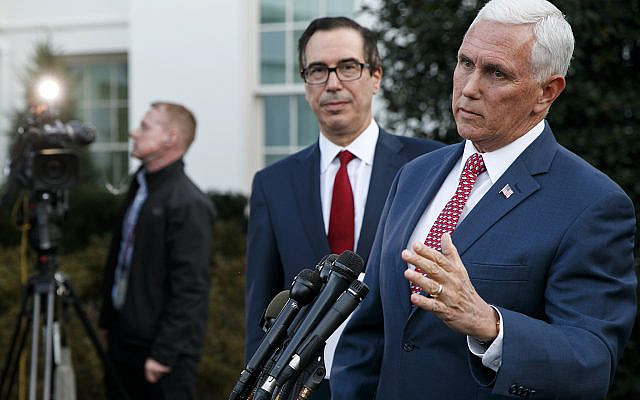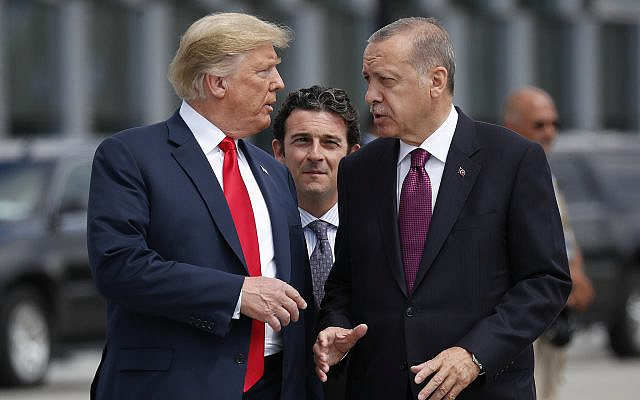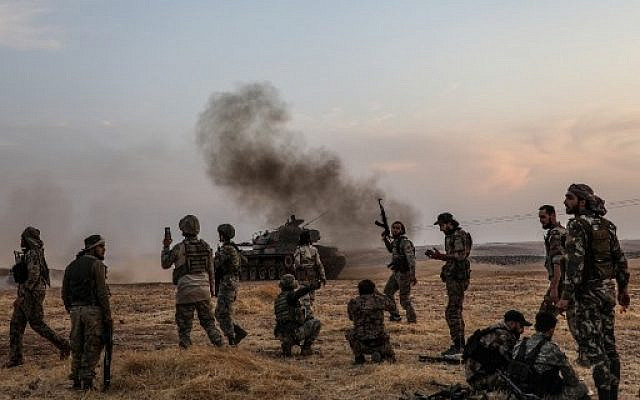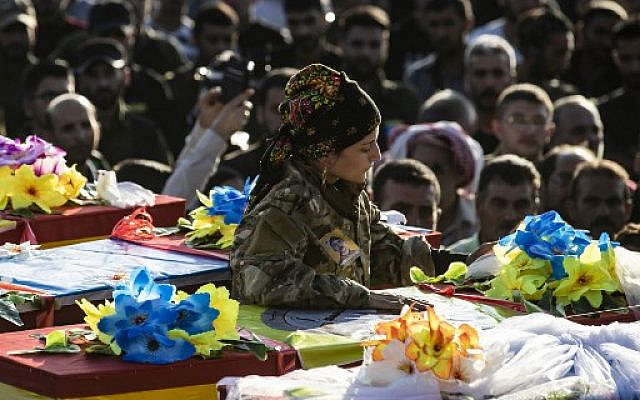T. Belman. This should have been done before the pullout. There would have been no need for Syrian troops. I always thought that Trump was using Eastern Syria as a bargaining chip when the ultimate disposition of eastern Syria was dealt with. He obviously squandered his strong position for nothing.
Pence must not start with the proposition that Turkey has the need to create a safe zone in Syria. Turkey must make the case for its necessity. I see no evidence of the need. Also I read that Turkey never agreed to be respomnsible for the containment of ISIS. Surely the Syrian refugees in Turkey required international agreement as to their disposal.
Finally why not leave it to Syria and Russia “to stop the invasion of Syria?” I thought that Trump wanted to wash his hands of of the interminable war, or so he said.
Vice president says Trump spoke with Erdogan and asked him to to ‘stop the invasion;’ US is ‘simply not going to tolerate Turkey’s invasion of Syria any longer’
By SHAUN TANDON, TOI Today, 3:33 am

Vice President Mike Pence, with Treasury Secretary Steven Mnuchin, speaks to reporters outside the West Wing of the White House, Monday, Oct. 14, 2019, in Washington. The US is calling for an immediate ceasefire in Turkey’s strikes against Kurds in Syria, and is sending Pence to lead mediation effort (AP Photo/Jacquelyn Martin)
WASHINGTON (AFP) — US President Donald Trump on Monday urged his Turkish counterpart Recep Tayyip Erdogan to “stop the invasion” of Syria, Vice President Mike Pence said.
Trump pressed the Turkish leader in a telephone call to “stop the invasion, to enact an immediate ceasefire and to begin negotiations with Kurdish forces in Syria,” Pence told reporters, adding that he would be traveling urgently to Turkey at the president’s request.
“He’s directed me to lead a delegation. I will be leaving as quickly as possible to travel into the region to pursue a ceasefire and negotiated settlement,” Pence said.
Pence said the president is “very concerned about instability in the region” and denied that Trump gave Turkey the green light to launch the invasion when he announced a troop pullout.
Pence said the US is “simply not going to tolerate Turkey’s invasion of Syria any longer.”
The United States slapped sanctions on Turkey on Monday as it demanded an end to its deadly incursion against Syrian Kurdish fighters, accusing its NATO partner of putting civilians at risk and allowing the release of Islamic State extremists.

The actions came hours after regime troops returned for the first time in years to parts of northeastern Syria, invited by Kurdish fighters desperate for protection as the United States pulls out.
Trump took extraordinary measures against a country that is officially a US ally as he faces mounting criticism at home, where even usually supportive lawmakers accuse him of abandoning Kurds who had spearheaded the fight against the Islamic State group.
“I am fully prepared to swiftly destroy Turkey’s economy if Turkish leaders continue down this dangerous and destructive path,” Trump, who until recently had touted his friendship with Erdogan, said in a statement.
The Treasury Department said it was imposing sanctions on Turkey’s defense, interior and energy ministers, freezing their US assets and making US transactions with them a crime.
Trump said he was also ending talks on a US-Turkey trade deal he valued at $100 billion and, in perhaps the most biting reprisal, reimposing tariffs of 50 percent of Turkish steel.

The United States had slapped the 50 percent sanctions on Turkey last year to win the release of an evangelical pastor whose detention had stirred up Trump’s base.
Signaling an escalating rift in relations, Defense Secretary Mark Esper said he would head next week to Brussels to ask NATO allies to punish Turkey over the incursion
NATO has long been seen as keeping Turkey in the Western orbit, but Erdogan angered the United States earlier this year by buying the major S-400 missile defense system from Russia.
Erdogan has vowed to crush the Kurdish-led Syrian Democratic Forces, which Erdogan links to separatists inside Turkey.
Turkey wants to create a roughly 30-kilometer (20-mile) buffer zone along its border to keep Kurdish forces at bay and also to send back some of the 3.6 million Syrian refugees on its soil.
The chaos in areas targeted in the six-day-old Turkish assault has already led to the escape of around 800 foreign women and children linked to IS from a Kurdish-run camp, according to Kurdish authorities.

The Kurds had repeatedly warned of that exact scenario when Western countries refused to repatriate their IS-linked nationals and when Trump made it clear he wanted to end the US military presence.
Esper, the US defense chief, said Turkey’s incursion had “resulted in the release of many dangerous ISIS detainees,” although Erdogan accused Kurdish forces of deliberately freeing jihadists to “fuel chaos.”
Trump also mused that the Kurds may be releasing prisoners to keep the United States engaged and, despite his actions Monday, staunchly defended withdrawing troops.
“Anyone who wants to assist Syria in protecting the Kurds is good with me, whether it is Russia, China, or Napoleon Bonaparte. I hope they all do great, we are 7,000 miles away!” Trump wrote on Twitter moments before the statement.
The United States said it is withdrawing all 1,000 troops from northeastern Syria, keeping in the country only its roughly 150 troops in the southern base of Al Tanf near the borders with Jordan and Iraq.



@ Yonatan:
The latest I have read is that the US Airforce does not use the Incirlik Airbase on a day to day basis but the nukes are still there.
@ Bear Klein:
We can certainly hope and pray that the US forces quietly moved such weapons but we will see what develops if further economic sanctions are applied against Turkey.
One thing that I have recently read that the USA never pulled the Nuclear Bombs from the USA Airbase in Turkey. After the Turks basically put the US pilots under house arrest during the attempted coup a couple of years.
Logic dictated that Turkey is not reliable nor an ally of any sorts the US needs to find an alternate airbase plus location to house the nukes. Someone had asked about a year ago if the US had pulled out the nukes. I responded by saying they must have done this quietly because no-one could be so stupid as to keep them there.
So I can see sanctions by Trump and Congress be increased significantly and Turkey responding by holding the nukes hostage.
Ted is right that all of Trump’s present moves should have been done before the pullout. But at least he has shown an ability to respond to criticism and begin to move in the right direction.
The great Greek playright Sophocles wrote 2,4000 years ago, about an ancient king, “any man can be wrong. But only a good man can admit he was wrong. The only sin is pride.” Robert F. Kennedy quoted this line when he publicly admitted he had been wrong about Vietnam.
Edgar made the point about a week ago that America’s military interventions in foreign countries, going back at least to Vietnam if not earlier, have tended to have bad results for all concerned. I should have paid more attention to what he had to say. America’s military intervention in Syria had largely negative results for the Syrian peoples (plural, not “people.”). Western meddling in the Middle East has had generally bad consequences for everyone, going back to 1914 if not earlier.
However, ending American meddling should also mean disintangling ourselves from Turkey. All U.S. military forces should be withdrawn from Turkey, all military aid to Turkey should be stopped, and harsh economic sanctions should be appied until they stop massacring the Kurds, etc. The U.S. should also demand the expulsion of Turkey from NATO. In fact, all this should have been done even before Erdogan came to power. Turkey has never apologogized or admitted guilt for the massacre of the Armenians or the massacre/expulsion of the Greeks during and after World War I. It has been waging war on the Kurds for decades, even before Erdogan came to power. It has been illegally occupying northern Cyprus for more that 50 years, expelled or murdered the 200,000 Greeks who used to live there, and planted Turkish settlers on the island. The U.S. originally made an alliance withthe Turks in 1947 in order to “contain” Russia. Once Cold War I ended in 1991, the U.S. should have ended its Turkish alliance, if not earlier.
Russia apparently does not intend to put much pressure on Turkey to withdraw or stop its invasion. It just wants to use the invasion as an excuse to enable Assad to get control of some parts of the formerly Kurdish zone.Possibly partitioning the region with Turkey. It looks like no one will protect the Kurds. They are on their own.
This article in the Kremlin’s unofficial mouthpiece Sputnik appears to lay out Putin’s plans for a takeover of Syria. Putin, like Trump last week, is trying to make a deal with Erdogan at the expense of the Kurds, but to the advantage of Assad. The deal will be for Assad’s men to take control of the Kurdish reading and “neutralize” the Kurds. In return, Putin hopes Turkey will agree to a phased withdrawal, without his having to apply sanctions, fight the Turkish army, or even publicly criticize Turkey.